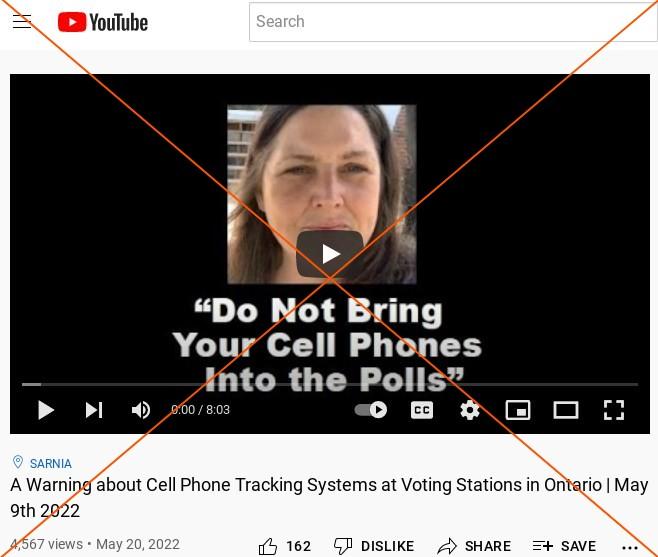
Video misleads on Elections Ontario research
- This article is more than three years old.
- Published on June 1, 2022 at 16:30
- 3 min read
- By Marisha GOLDHAMER, AFP Canada
"A Warning about Cell Phone Tracking Systems at Voting Stations in Ontario" is the title of a video posted to YouTube on May 20, 2022.
The eight-minute video, which can also be found on Bitchute and Rumble, was first aired May 9 on Facebook Live by Carla Olson, the Populist Party candidate from Sarnia-Lambton. It has more than 15,000 views across platforms.
After learning that Elections Ontario plans to research polling place wait times by collecting cell phone data, Olson describes in the video "another situation where our government is potentially spying on you." She says she does not want to discourage anyone from participating in the election but warns: "You should not bring your cell phone when you go to cast your vote. It matters. Your privacy matters."

AFP reached out to Olson for more information but did not receive a response.
Olson mentions in the video Ontario's delayed Digital ID program and private data unintentionally leaked via a vaccine passport app in Canada as reasons to be skeptical of this government research.
But Elections Ontario told AFP in an emailed statement that Olson's video "contains many inaccuracies."
It said Forum Research, a Canadian market research and polling firm, will study voter wait times in 25 electoral districts to "satisfy the requirements of the Election Act which states that improvements to the elections process shall be evaluated."
The province said it wants to know the busiest times at polling places to ensure they are adequately staffed. It said it chose to pilot the use of electronic counters in part to ensure the research can be carried out while physical distancing is maintained to slow the spread of Covid-19.
The statement said: "The counters don't collect any identifying data, simply a detection of a device and a timestamp. There is nothing in the data that can be used to identify an individual or any information about them."
AFP asked Forum Research for more information about the data it will collect but did not receive a response.
Asked about the plan, Teresa Scassa, Canada research chair in information law and policy at the University of Ottawa, said: "If no personal data is being collected, then there's no privacy risk and privacy legislation doesn't apply."
Scassa said she had not seen specific details on the technology being deployed in Ontario, but that studying phone data to help improve voter services on election day is a legitimate purpose that should be transparently explained to the public.
She said the video is "used to build a narrative of distrust in government."
However, Brenda McPhail, director of the privacy, technology and surveillance program at the Canadian Civil Liberties Association (CCLA), told AFP her organization believes the province could have chosen a less high-tech solution for carrying out the research.
"CCLA has concerns regarding any research project that might undermine public faith in the integrity of the electoral process; a decision to conduct any research at polling stations that might, even wrongly or unnecessarily, cause voters concern about their privacy while voting is a poor one," she said.
No effect on voting
Elections Ontario's statement also said: "Bringing a phone (or not bringing a phone) with you when you vote has absolutely no effect on whether a vote is recorded."
This was echoed by Holly Ann Garnett, co-director of the Electoral Integrity Project, an independent academic group that studies the democratic quality of elections.
"Paper ballots are scanned into a tabulator. Having your cell phone in your pocket will not impact this process at all," she said.
Garnett said the research planned by Elections Ontario did not raise privacy concerns for her, as the electoral body already keeps voter records and requires ID to receive a ballot.
She also said this type of research had been used successfully in other countries, pointing to a study that found a racial disparity in voting wait times in the United States.
"Using cell phone data is one way they can determine how to better manage poll workers, especially where finding and training poll workers may be more difficult due to a short supply of volunteers," she said.
More than one million Ontarians have already cast ballots during advance voting.
AFP Fact Check also debunked the false claim that Ontario would require proof of Covid-19 vaccination to vote.
Copyright © AFP 2017-2026. Any commercial use of this content requires a subscription. Click here to find out more.
Is there content that you would like AFP to fact-check? Get in touch.
Contact us
